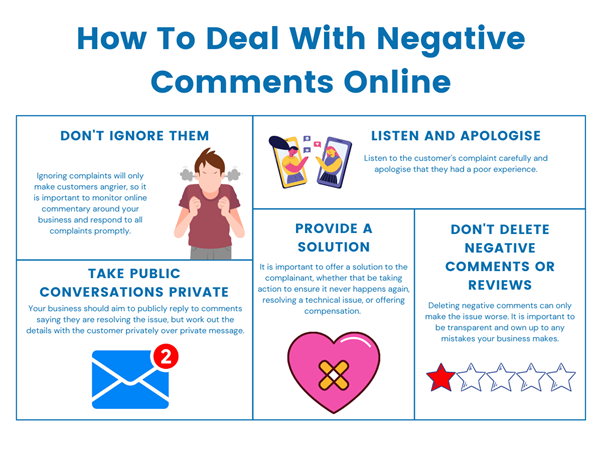Dealing With Negative Comments Online
January 21, 2022
At some point in time, you may run into a situation where you find that someone has posted negatively about your business online.
This may have been a post about your business in a Facebook community group, a bad Google or Facebook review, or a complaint raised on Twitter. In any case, there is a right way to deal with negative comments online and a wrong way, and it is important that you get it right to reduce the reputational damage to your business.
To help you handle internet critics, Business Foundations has compiled a guide on how to deal with negative comments online.

Don’t Ignore Them
Customers hate being ignored, so it is really important that you can identify and respond to online criticism quickly. Whilst it may be tempting to delete the comment or ignore them, you wouldn’t ignore a customer in person therefore you shouldn’t do so online.
To ensure you are aware of any online complaints, monitor your Google and Facebook reviews regularly, and consider implementing a social listening tool to monitor mentions of your business across other social media websites.
Take Public Conversations Private
One of the best ways to handle online complaints, is to immediately try and steer the conversation to somewhere private. Once you come across a complaint about your business, tell the person that you apologise and want to resolve their problem, and let them know that you have messaged them privately.
This indicates to online bystanders that you have dealt with the problem, but also gives you the opportunity to handle the issue with the customer in private rather than going back and forth publicly.
Listen To Your Customers And Apologise
It is important to listen to your customer’s concerns carefully so that you know exactly what they are upset about and what needs to be resolved. This prevents any further misunderstandings that can make the problem worse.
In addition, you should always apologise to the customer, but you don’t necessarily need to admit fault to every complaint.
An example of this would be if a customer complained because they didn’t like your product, you may not be sorry about the product, but you can be sorry that they had a disappointing experience.

Provide A Solution
After you have listened and apologized, you may be able to offer your side of the story if it is appropriate to do so. It is important to not get defensive, but you can offer a short explanation on why the issue occurred, and if relevant, how you will prevent it from happening again.
Depending on the complaint, you may also need to be able to offer a solution to the customer, whether that be resolving a technical issue, providing a refund or gift card compensation, or more.
This can be a great opportunity to resolve your customer’s grievances and restore their faith in your business.
Bonus Tip: Don’t Delete Negative Comments Or Reviews
As much as it might be tempting to delete negative reviews, especially if they are unfair, it may just make things worse. If your business is caught curating your online reviews and feedback, it throws all of your reviews into question – even the positive ones.
Instead, reply to these reviews by apologizing and promising to resolve the problem. Potential customers will respect your business more by seeing that you are willing to deal with issues when they arise.
It can also provide them with the confidence that if they deal with your business, they can trust that you will resolve any problems that arise.

How you with criticism online can influence how customers and the public view your business.
If handled well, complaints can actually turn into a positive for your business and show online bystanders that you care about your customers and are willing to solve any issues that occur.
Acknowledgement Of Country
Business Foundations acknowledges the traditional custodians throughout Western Australia and their continuing connection to the land, waters and community. We pay our respects to all members of the Aboriginal communities and their cultures; and to Elders both past and present.
Victoria
The Commons
80 Market Street,
South Melbourne VIC 3205
admin@businessfoundations.com.au
Western Australia
Wesley Central
2 Cantonment Street,
Fremantle WA 6160
admin@businessfoundations.com.au


Get In Touch
Have a question or to find out how we can help you, please get in touch.






